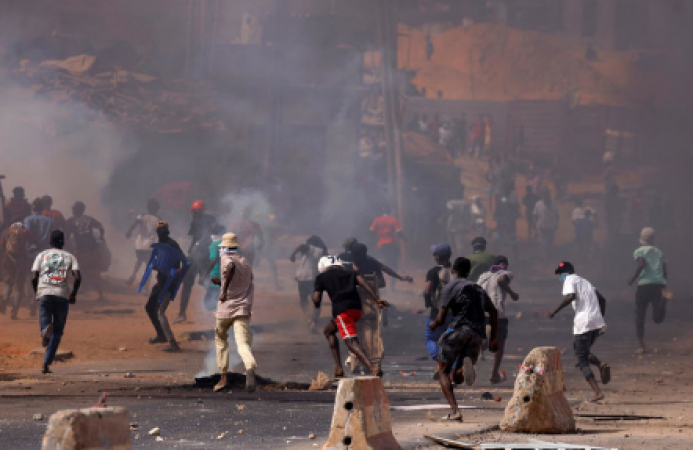
Dakar: On Friday, the African Union and the United Nations issued a call for calm in Senegal following a spate of violent deaths that prompted the government to send in the army.
After Ousmane Sonko, a well-known opposition politician, was given a two-year prison sentence on Thursday and may no longer be eligible to run for president in 2024, nine people were killed.
Antonio Guterres, the UN Secretary-General, denounced the violence and "urged all those involved to exercise restraint," according to a spokesman.
Also Read: BRICS envisions a multipolar world order and believes that strength comes from numbers
The African Union stated that Moussa Faki Mahamat, the commission's president, strongly denounced the violence and pleaded with authorities to refrain from doing anything that would "tarnish the face of Senegalese democracy, of which Africa has always been proud."
All parties were urged by the Community of West African States (ECOWAS) to "defend the country's laudable reputation as a bastion of peace and stability."
Concern over the violence was also expressed by the EU and France, a former colonial power in Senegal.
Sonko was found guilty of "corrupting" a young woman, a conviction that has polarised Senegal, a country known for its stability in West Africa.
Following some of the worst political violence in years on Thursday, tensions were still high on Friday, with sporadic clashes being reported in the capital and soldiers being stationed on the streets.
Also Read: Greek fishermen are in combat to solve the plastic pollution in ocean
Sonko, who was tried in absentia, hasn't been arrested yet for his jail sentence, which is probably going to exacerbate tensions.
Journalists from AFP reported that the streets of the capital were largely deserted.
The government admitted that it had imposed access restrictions to social media sites like Facebook, WhatsApp, and Twitter in an effort to halt "the dissemination of hateful and subversive messages."
On the main university campus, where protracted clashes occurred on Thursday, there was significant destruction.
After being told to leave campus, students with suitcases lined the streets outside of the university as they searched for transportation.
Student Babacar Ndiaye, 26, said, "We didn't expect this, political affairs shouldn't concern us.
He continued, "But there is injustice," referring to Sonko's conviction.
Around 30 civilians have died in unrest largely related to Sonko's legal issues since his arrest in 2021.
The violence is attributed to both the government and the opposition.
Sonko was initially accused of raping and threatening to kill a worker at a beauty parlour where he claimed to get massages.
However, the court dismissed these accusations against him and instead found him guilty of "debauching" a person under the age of 21 without elaborating on the alleged immoral acts.
The verdict would appear to disqualify him from running in the election of the following year under the electoral code.
The government disputes Sonko's claim that the president is trying to frame him in order to prevent him from running in the election the following year. Sonko has maintained his innocence.
Residents of Dakar questioned by AFP expressed fear over the potential repercussions of an arrest. Yankouba Sane, a university employee, says that if they take him into custody, "we have to fear the worst."
Also Read: In an Oval Office speech, Biden applauds the avoidance of a "catastrophic" default
Ousmane Sonko, according to 46-year-old shopkeeper Alioune Diop, "won't ever go to prison in Senegal." "They'll make the situation worse if they put him on trial,"
Sonko is believed to be still inside his Dakar home, where security personnel have been barricading him in since the weekend. He claims that he is "illegally being held."
Senegalese international football star Sadio Mane and Serigne Mahi Ibrahim Niass, the Khalifa General of Medina Baye and a prominent religious leader, have both called for peace.
Amnesty International called on the government to end "arbitrary arrests" and remove restrictions on social media use.